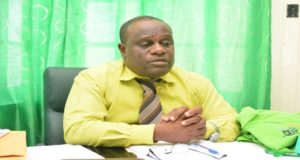
Royston King, Town Clerk of the Mayor and Councillors of the City of Georgetown (M&CC), has been unsuccessful in his attempt on Monday to obstruct the work of the Commission of Inquiry into City Hall’s operations by filing an affidavit challenging the legality of its establishment.
Chairman of the CoI, Justice (Retd) Cecil Kennard, ruled that the probe was duly constituted, and in accordance with provisions made under the Local Government Commission Act and supplementary laws.
Having been Town Clerk of the M&CC for some three years, King has been subpoenaed to present himself for questioning. He turned up on Monday with his attorney, Maxwell Edwards, at the Critchlow Labour College, where proceedings of the CoI are taking place. A five-page affidavit was submitted, which questioned the manner in which the inquiry was established, and its legality.
“In terms of the affidavit, it says that…the Commission must be declined jurisdiction to conduct this inquiry, and the basis to that is, I would submit, that this Commission is void and a nullity on two grounds,” the Town Clerk’s attorney said.
Edwards’s argument is that the Local Government Commission Act does not permit for an investigation to be delegated to a Commission of Inquiry, but only that of a local authority.
He also alluded to the Municipal and District Councils Act, Chapter 28:01, which states that Communities Minister Ronald Bulkan is responsible for establishing such an investigation. He further stated that this was not done, since the Local Government Commission was the respective body that launched the investigation.
“The first (point of contention) is the jurisdictional ground, and that has to do with the interpretation of Section 14 (1) and (2) of the Local Government Commission Act, under which this Commission has been established,” said Edwards.
Further, he added, “Having a right under the eighth schedule [of Chapter 28:01] to establish a Commission. Certainly, this is not a Commission established by the Minister [of Communities].”
However, submission from the Commission’s lawyer, Everton Singh Lammy, is that the CoI was established legitimately under provisions made by the Local Government Commission Act, and the appeal was effectively dismissed by evidence presented in Section 14.
He further noted that sections of Chapter 28:01 were exercised in the Local Government Commission Act.
Singh-Lammy referenced from the Act and stated, “For the purpose of the exercise and discharge of its function, the Commission shall have the power to initiate and conduct investigations into the activities of any local government organ.
“For the purpose of dealing with matters before it, the Commission shall have all the powers to submit witnesses, and all the privileges and immunities as vested in a Commission appointed under the Commission of Inquiry Act,” Section 14 (2) continues.
Provided with concrete evidence, the Chairman ruled, “The magnitude of such an investigation demands that the inquiry be conducted by a trained legal person, and not lay persons who are commissioners of the Local Government Commission; and one would have to adopt a realistic approach and examine all the relevant sections. Does that mean that the Local Government Commission cannot delegate some of its functions? Surely not. That would be adopting a very narrow view.
“I’ve been spending a lot of time looking at the various legislation, statutes, and I’ve come to the conclusion that this Commission of Inquiry was properly set up.”
In an effort to shortcut the Town Clerk’s time on the evidence stand, Edwards disclosed that King was concerned about whether he would get justice from the inquiry. This was because historical records were examined by Justice Kennard after it was disclosed that King had instructed for those documents to be removed from the archives.
“These are books of historical purposes that date back to 1843. What relevance would that have…with a Commission?” Edwards questioned, seemingly upset while holding a newspaper that had the story inked on the front page.
Those doubts were laid to rest by the retired Justice, who outlined that to conduct a proper investigation, the issues that were brought to attention must corroborate at all angles to ensure that ideal recommendations are made. Additionally, he said, the state of affairs of these books needed to be examined as well.
Representing the Commission, Attorney-at-Law Sherwin Benjamin remedied the situation by denoting, “You would appreciate that the Commission of Inquiry have to make recommendations on what is the truth, what evidence came out. We decided that out of abundance of caution, we have to investigate and ensure either side, because the information we got was conflicting.”
Royston King has again been summoned to the CoI, where on Friday he will answer questions regarding several matters which were highlighted at the prior sessions. These include the no-confidence motion that was dismissed after opinions were sought from his lawyer, and the land owned by NICIL which was leased to a shipping company.
No apology
Prior to commencement of the session, Justice Kennard said he was standing by the words he had directed towards Mayor Patricia Chase-Green when she had attempted to create a disturbance during her cross-examination on Friday last.
Justice Kennard has been a lawyer for 56 years, during which time he had also served as State Counsel, High Court Judge, Justice of Appeal and Chancellor of the Judiciary. Moreover, he had been seconded to serve as Director of Public Prosecutions in Antigua and Barbuda.
Additionally, he has been conferred with the following National Awards: The Order of Roraima (OR) and the Cacique Crown of Honour (CCH).



